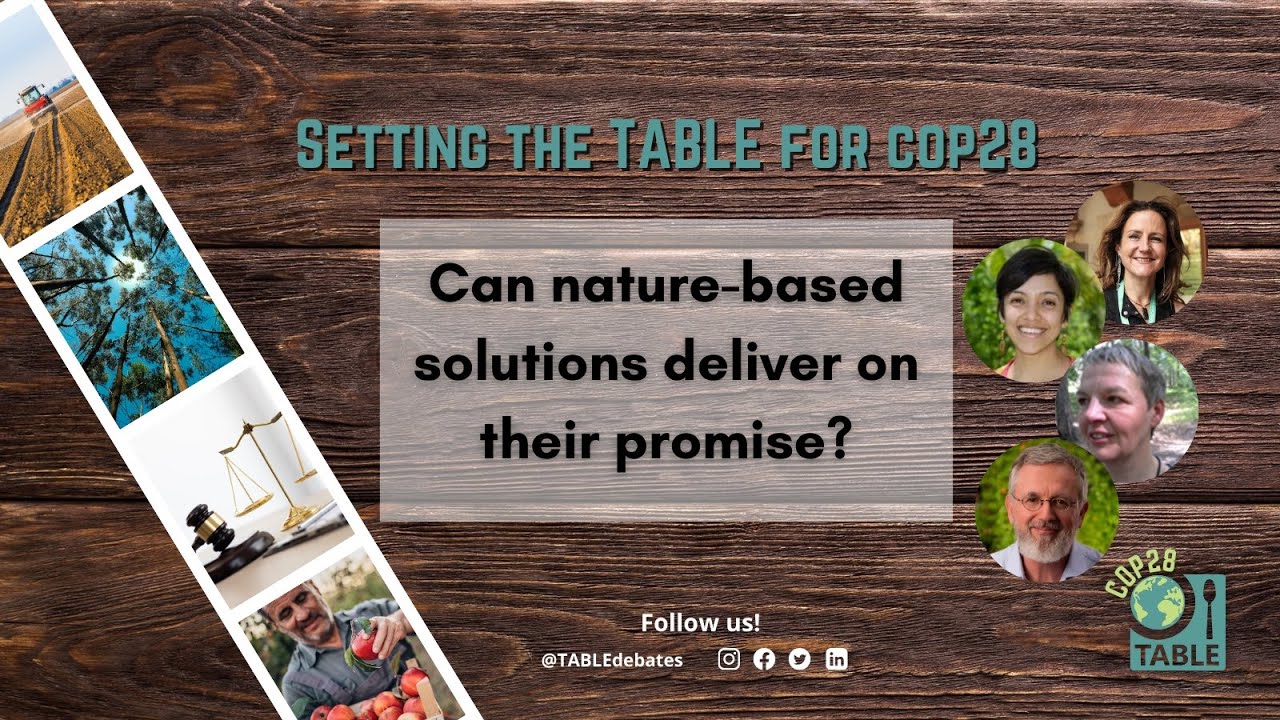Event Summary & Recording: Can nature-based solutions deliver on their promise? | TABLE Debates
“Nature-based Solutions” (NBS) – broadly defined as activities that harness the power of healthy ecosystems to tackle societal and environmental challenges, providing ongoing benefits for humans and biodiversity – have been gaining interest from policymakers, industry, and NGOs since the idea was introduced in the late 2000s. For some, the growing interest in NBS is a cause for celebration and a win for environmental concerns. For others, it’s a dangerous concept – one which acts as a cover for corporate expansion of environmentally catastrophic fossil fuel projects – while adding nothing new to the positive ideas for social and environmental change already out there.
On 31st October, TABLE spoke with advocates and critics of the concept, hoping for a clearer understanding of the fault lines and common ground. First up, Nathalie Seddon (Professor of Biodiversity and Nature-based Solutions Initiative founder) who viewed the uptake of NBS as a largely positive step, that has allowed major international organisations to see that healthy local biodiversity is the key that “supports the flow of the many ways nature supports people.” But there are crucial boundaries to NBS that need to be made clear in practice. Any benefits from nature depend on “keeping fossil fuels in the ground”, added Seddon. “Offsetting does not work, and nature-based solutions must not be conflated with offsetting or forestry.”
While Seddon recognised that this theoretical ideal might not be working perfectly in practice, Jutta Kill (independent researcher and critic of NBS) and Kirtana Chandresakaran (Friends of the Earth International) questioned whether NBS was ever such a well-meaning idea in the first place. Kill responded that it’s important to look at who is using the concept, including major oil companies. In this context, NBS are “serving as an excuse to prolong fossil fuel extraction” and as an excuse for land grabs. Chandresakaran added that, at its core, NBS is being driven by the interests of the financial sector and being integrated directly with carbon and biodiversity offset markets.
Roberto Waack (Arapyaú Institute, Associate Fellow of Chatham House) shared the view that the driving organisations interested in NBS are the private sector and investors, and that NBS often manifests as greenwashing and another way for nature to be monetized rather than protected. But as a biologist who works with and for companies in beef production, recycle plastics, and forestry, he doesn’t view these problems as a reason not to work closely with companies on tackling their environmental impacts.
What were the commonalities and divergences as the conversation progressed?
There was a clear disagreement on the origins of the NBS concept. Seddon argued that the term “emerged in the world of biodiversity conservation and adaptation”, and that it had been recently co-opted by the fossil fuel industry. Kill took the view that there was never any co-option: NBS from the start had been linked with industry interests as a way of “relabelling” a collection of good and bad existing practices. While Seddon was keen to “double down” on what conservationists really mean by the term, Kill and Chandresakaran viewed the concept in its current form as unusable. As Chandresakaran put it, “the dangers far outweigh the benefits” of using a term that has created a “wild west” situation, offering a “massive catch-all to allow everybody to do whatever they want.” In this case, it’s better to stick with well-established terms for good practices grounded in nature, especially when they have a built in social and environmental justice angle, as is the case for agroecology.
Perhaps (a thought from TABLE here), the language of “solutions” is, to some, problematically apolitical. For them, “solutions” are the language of magic bullets, of techno-fixes – or in this case eco-fixes, and they slot too neatly into the current system. They don’t seek to transform it. For others, though, NBS can be a transformative concept, if transformative ideas are built into its definition – or, at a minimum, it can still have a role to play in a broader systematic approach to change.
And in fact, most of the panellists did see system change as essential. Seddon, Kill, and Chandresakaran all repeatedly advocated for it. On the question of engaging with the existing system as a pragmatic mechanism for change, Seddon and Waack both saw the benefits of working with private companies. Waack diverged from the other speakers, though, in terms of his views on how to deal with the intersection of nature and economics. He adopted a mainstream environmental economics approach, often referred to as taking account of “externalities”, meaning companies need to account for the harm they do to nature and pay damages for it.
Taking NBS out of the equation for a moment, there was a lot to agree on when it comes to the challenges we face and the actions we need to take. The speakers shared an observation of widespread greenwashing as a cover for destructive activities; agreed on the absolute need to decarbonise now and the culpability of the fossil fuel sector in obstructing this process; were critical of carbon offsetting practices; believed in the centrality of protecting the rights and lands of indigenous communities; and showed strong support for robust regulatory mechanisms to make all of this possible.
Event summarised by Hester van Hensbergen.


